| Srl | Item |
| 1 |
ID:
091727
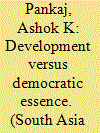

|
|
|
|
|
| Publication |
2009.
|
| Summary/Abstract |
This article reflects on the role of voters' preference for democratic essence over development-related issues in the 2005 Haryana and Bihar Assembly elections. Based on analysis of these elections, it is argued that in a society where the distributive effects of development are less than egalitarian, economic deprivations are reinforced by socio-political inequality, but democracy still promises to be a great equaliser and source of empowerment for the masses. Democratic issues therefore appear to have greater electoral and political appeal than promises of 'development' or small morsels of favour to entice an electorate. This finding indicates an increasingly sophisticated understanding of the Indian electorate about the critical relevance of democracy.
|
|
|
|
|
|
|
|
|
|
|
|
|
|
|
|
| 2 |
ID:
118380
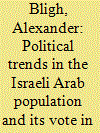

|
|
|
|
|
| Publication |
2013.
|
| Summary/Abstract |
Full Arab Israeli involvement in the national political system is disappearing from the Israeli political scene. A parallel system is being developed by the community's political leaders. Within this new structure, national elections and the Knesset are viewed as marginal; they serve mainly as a PR arena intended to bring the Arab Israeli message to Jewish/Zionist awareness. Judging from the evidence of recent election results among Arab voters, it is possible to cautiously conclude that the Israeli Arab political stance is less and less a part of the general Israeli political culture.
|
|
|
|
|
|
|
|
|
|
|
|
|
|
|
|
| 3 |
ID:
187561
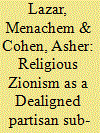

|
|
|
|
|
| Summary/Abstract |
During the second decade of the twenty-first century, Israel’s Religious Zionist camp has undergone a process of accelerated Dealignment of its partisan system, resulting in the transformation of the political parties comprising it into a Dealigned Partisan Subsystem. An example of this process can be found in the transformations that took place in the ‘Jewish Home’ Religious-Zionist political party led by Naftali Bennett. Within 9 years and seven election campaigns, the party succeeded in trying out the Open Camp Party model, experiencing a division led by Bennett himself, and finally reaching the verge of disappearing and once again initiating renewed revival attempts. The Dealignment of partisan systems includes a high level of voters’ mobility; a decline in the support of existing mainstream parties; a decline in voting rates; and a decline in the strength of partisan identification, while voting patterns become more personal. The partisan system itself changes during this stage, with old parties disappearing and others rising in their place, often only to disappear from the political map as quickly as they appeared. This article illustrates the extent to which the Religious-Zionist partisan subsystem in Israeli politics during the second decade of the twenty-first century until the 2022 elections campaign corresponds with most characteristics of a Dealigned system.
|
|
|
|
|
|
|
|
|
|
|
|
|
|
|
|
| 4 |
ID:
123432
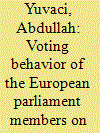

|
|
|
|
|
| Publication |
2013.
|
| Summary/Abstract |
By quantitatively analyzing how Members of the European Parliament (MEPs) voted on an amendment that proposed a special status for Turkey, this article aims to shed some light on the voting patterns of MEPs on the question of Turkish accession to the European Union. The article finds that although member-state and European party group affiliations were related to MEPs' voting behavior on Turkey, MEPs' national party preferences were the strongest predictor of the vote. In addition, the study shows that the GDP per capita and public opinion were also highly correlated with MEPs' voting attitudes toward Turkish accession.
|
|
|
|
|
|
|
|
|
|
|
|
|
|
|
|
| 5 |
ID:
151140
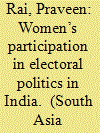

|
|
|
|
|
| Summary/Abstract |
The recent participation levels of women in formal
politics in India reveal two positives that augur well. First, the
upsurge among women voters that started in the 1990s reached the
highest female turnout ever, so far, in the 2014 Lok Sabha elections.
Second, women’s participation in high-voltage election campaigns
during the 2014 general elections also showed a substantial
increase. However, the continued under-representation of women
in legislative bodies and within the rank and file of political parties
offsets the momentous gains made in the people-driven feminisation
of electoral politics in India.
|
|
|
|
|
|
|
|
|
|
|
|
|
|
|
|